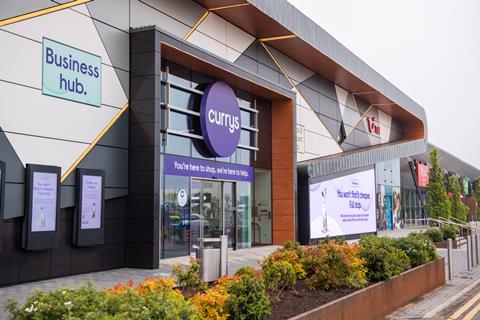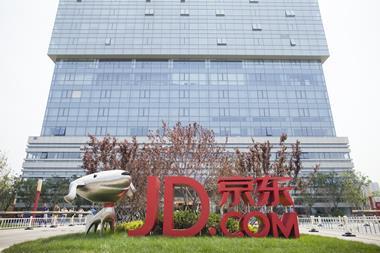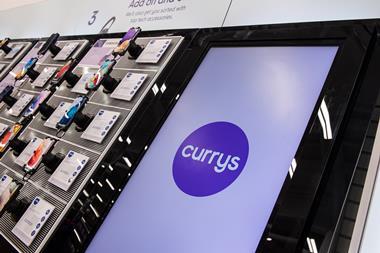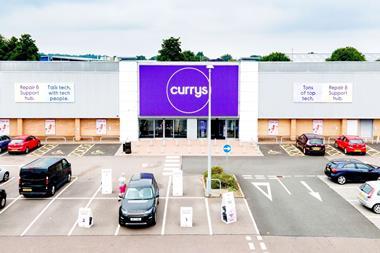The starting gun has well and truly been fired in the race for a takeover of UK electricals retailer Currys, with reports emerging that US investment firm Elliott and Chinese ecommerce giant JD.com are both mulling bids
Elliott, which owns book specialist Waterstones, could well come in with a concrete offer, which is being reported as high as £700m.
JD.com, meanwhile, emerged as the frontrunner early this week, saying this morning that it is in the “very preliminary stages of evaluating a possible transaction that may include a cash offer”.
Both Elliott and JD.com have until March 16 and 18 respectively to make a formal offer or abandon any potential deal.
With two companies showing a keen interest in buying the UK-based electricals retailer, Retail Week takes a look at what a successful bid would mean for Currys and whether this flurry of activity will bring more buyers out of the woodwork.
International expansion
While an initial bid from Elliott has been rejected for now, sources believe that JD is working its way towards a formal offer. But why is it interested in Currys in the first place?
Clive Black, vice-chair at Shore Capital, says JD is most likely looking to buy Currys because it has a “very strong market position in the UK”.
“JD does quite a lot in the electronics sector and it clearly has got buying scale,” he says.

“It may feel Currys can deliver buying and distribution benefits too, as well as capabilities in ecommerce, and Currys’ scale could add to JD’s buying power at a group level.”
Investec equity retail analyst Ben Hunt sees the possible takeover from JD as a reflection on the Chinese economy as many retailers in this country are “struggling”.
While JD has seen steady growth in recent years, with its latest results showing a 2% increase year on year to RMB247.7bn (£27bn), the Chinese economy has been slow to recover post-Covid, with Reuters reporting that it narrowly beat its economic growth target of 5% in 2023.
However, Chinese giants Temu and Shein have been growing exponentially in international markets, with the latter set to gain £2.5bn in UK sales in 2027/28, according to Retail Navigator by Lumina Intelligence.
Emily Salter, lead analyst at GlobalData Retail, says the “geographical diversification” of JD could help protect it against a slowdown in sales in China.
She says purchasing Currys would give JD access to the UK market as well as help it make a name for itself in the Nordics, where Currys also operates – albeit in a struggling market.
Another question concerns what pureplay JD would do with the 289 UK stores Currys has in the UK – not to mention the more than 800 it has around the globe.
Hunt says JD could forgo the stores, but this would go against current trends with many retailers looking to bolster their physical presence with flagship openings and store expansions.
It would also fly in the face of the post-pandemic strengthening of footfall and increase in bricks-and-mortar shoppers over the past year or so, which has added to the troubles of UK pureplays AO, Asos and Boohoo.
Electricals is also a channel that lends itself well to bricks and mortar, with customers preferring to try products before they buy them.
Hunt says JD could experiment with Currys stores to operate a click-and-collect model, “which has economic benefits” and is “the way forward for a lot of retailers”.
Uncertain future
Currys has traded through tough market conditions recently, with sales slipping over the Christmas period.
Salter says high inflation has made it hard for the retailer to “generate growth”, with the situation unlikely to improve this year and growth for the UK electricals market forecast to be “sluggish” in 2024.
“Acquiring Currys would not bear fruit immediately, but JD.com’s ownership of it could enable it to bolster its online operations further, helping it better compete with Amazon,” she says.
A Currys spokesperson told Retail Week the business does not have a set offer in mind and that “all shareholders have different views” on the valuation.
It is hard to picture what Currys might look like under JD or Elliott, especially when formal offers are yet to be made, but Hunt believes Currys operates similarly to a private equity model “to some extent” as it is preserving cash and getting rid of assets such as its Greek business Kotsovolos.
Operating under a private equity model does not usually spell success, as recently seen with The Body Shop, which appointed administrators less than three months after being bought by Aurelius.
Morrisons also suffered a £1.5bn loss a year after being acquired by CD&R and took on a £6.1bn debt pile in addition to £400m in interest repayments.
Hunt says private equity brings both cost-cutting and stripping back capex, but Currys already has a “pretty low capex”.
“Currys has done a lot of the cost savings itself,” he says. “So there isn’t a huge amount of meat on the bone that you can carve off at the moment.”
Bidding war
The news of a potential takeover of Currys could well spark more interest from other retailers and rival private equity firms keen to put in an offer.
One retailer circled by analysts is Frasers, with both Hunt and Black saying the retail giant’s 11% stake in Currys puts it in a good position to purchase the whole business.
Black says: “Currys is in play; whether Frasers and Mike Ashley think this is a time to bid for Currys, we will see.
“If any in the trade or elsewhere want to be involved in Currys, they’re going to have to move now.”
Black says a bidding war could well be on the cards and the Currys board is “not in a position where it can ignore offers forever”.
With Currys rejecting one approach so far and more companies set to throw their hats in the ring, the story of a Currys takeover is just beginning.


























No comments yet